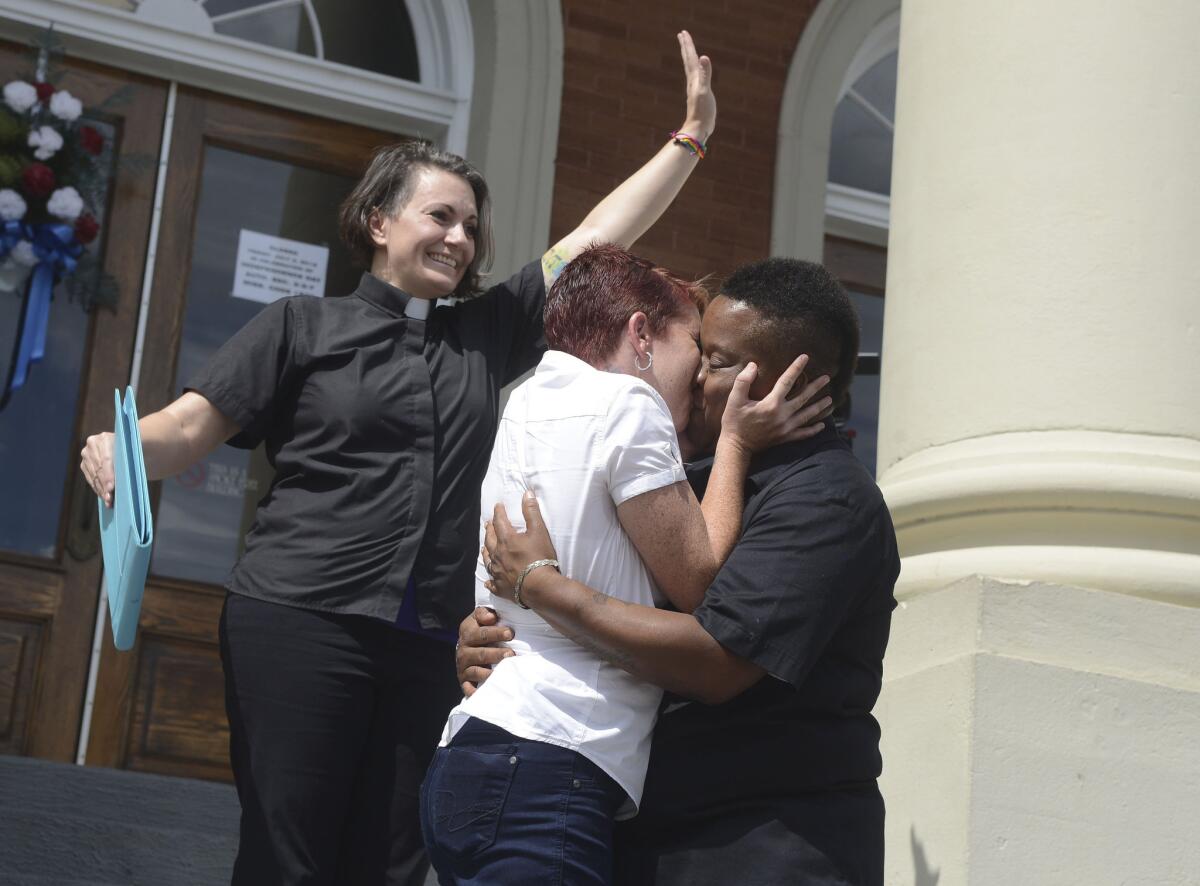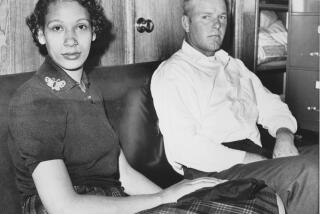Mississippi in limbo over high-court’s same-sex marriage ruling

Amber Hamilton and Annice Smith share their first kiss as a married couple in front of by Pastor Brandiilyne Dear on the steps of the Forrest County Courthouse in Hattiesburg, Miss.
Reporting from Tupelo, Miss. — Amber Hamilton and Annice Smith were the first same-sex couple to wed in Mississippi, and nearly the last, at least for a while.
About an hour after the pair filled out the requisite paperwork, handed over $21 for a marriage license and sealed their nuptials with a happy kiss Friday morning on the steps of the county courthouse in Hattiesburg, another lesbian couple, Shelly Cranford and Shannon Smith, received a far different reception.
Their mistake? Arriving just after Mississippi’s attorney general, Jim Hood, declared that the U.S. Supreme Court ruling declaring same-sex marriage a constitutional right would not be observed in the Magnolia State.
INTERACTIVE: Track changes in the law since 2000
Not yet, anyway, Hood said, as Mississippi, long at the heart of America’s most divisive issues, from slavery to school integration, once again dug in its heels against the winds of change.
“This hurts us,” Shannon Smith said after her giddiness turned to heartache. “We’ve been waiting 13 years.”
Mississippi’s decision on Friday, after just three same-sex weddings, underscores the tortuous road to gay marriage in America, and shows that even a ruling by the nation’s highest court cannot force immediate change where opposition is so deeply entrenched.
Hood said the Supreme Court’s 5-4 ruling would not be effective until the U.S. 5th Circuit Court of Appeals gives gay weddings the go-ahead. Nobody knows when or even if that will happen, leaving same-sex couples and court clerks in limbo.
To understand Mississippi’s resistance to gay marriage, it helps to look at its legacy as a deeply religious and conservative state. This is where three civil rights workers were killed by the Ku Klux Klan in the 1960s; where James Meredith became the first black student to enroll in Ole Miss, but only after a violent confrontation; and where the Confederate symbol is still part of the official state flag.
It is where 59% of residents described themselves as “very religious” in a 2014 Gallup Poll, higher than any other state, and where 86% of voters in 2004 approved a ban on same-sex marriage.
“It’s tradition,” said Ed Vitagliano, executive vice president of the Tupelo-based American Family Assn., which calls itself a “national Christian organization that exists to inform, equip and activate individuals to strengthen the moral foundations of American culture.”
“For the most part, it’s called the Bible Belt for a reason,” said Vitagliano, who is also pastor of Harvester Church, a small, nondenominational church in the Tupelo suburb of Pontotoc. “I’m sure Mississippi is no more spiritual than many other states. But they have been used to seeing the world through the lens of their Christian faith.”
Meeke Addison, an American Family Assn. spokeswoman who has a radio show on its network, American Family Radio, said it is not just people in Mississippi who are aghast at the Supreme Court’s ruling. Addison said there is a nationwide trend toward portraying nontraditional families as the norm and casting aside what she said is the ideal image of a mother, father and children.
“People are very confused about the legitimacy of their beliefs, because they have been so inundated with other images and people telling them what family is and telling them what is acceptable,” she said.
“There’s no biblical defense, there’s no biblical support of homosexuality,” Addison said.
The high court’s ruling will force court clerks and others who oppose same-sex marriage into untenable situations if they are faced with having to issue marriage licenses or recognize the weddings in legal or other situations, she said. “Because you want to submit to the law of the land, you also want to submit to the God you serve. And to find yourself in a position where now to do one goes against the other is unfortunate.”Started in Tupelo in 1977, AFA has a radio network that broadcasts to nearly 200 stations in 38 states. Its webpage Friday carried blog posts like the one by Bryan Fischer, host of a program on the AFA network called Focal Point.
Started in Tupelo in 1977, the American Family Assn. has a radio network that broadcasts to nearly 200 stations in 38 states. Its webpage Friday carried blog posts like the one by Bryan Fischer, host of a program on the American Family Assn. network called Focal Point.
“Rainbow jihadists of SCOTUS blow up twin towers of truth and righteousness,” was the grabby headline. “From a moral standpoint, 6/26 has become our 9/11,” it began. Fischer described June 26 as “a day which will live in infamy. It is a day on which behavior which is an abomination in the eyes of a holy God was normalized, promoted, celebrated and imposed on a nation built on the foundation of the Judeo-Christian tradition. On this day, the United States became Sodom and Gomorrah.” “Rainbow jihadists of SCOTUS blow up twin towers of truth and righteousness,” was the grabby headline. “From a moral standpoint, 6/26 has become our 9/11,” it began. Fischer described June 26 as “a day which will live in infamy. It is a day on which behavior which is an abomination in the eyes of a holy God was normalized, promoted, celebrated and imposed on a nation built on the foundation of the Judeo-Christian tradition. On this day, the United States became Sodom and Gomorrah.”
It wasn’t difficult to find people who agreed with Addison in Tupelo, where the air was heavy with lingering humidity from a morning of rain. From the visitors lingering on the lush lawn outside the white wooden house where Elvis was born, to the women in hair salons, the view seemed to be that if gay people want to be coupled, they should not expect the same health, tax and other benefits that heterosexual pairs enjoy.
“If gays want to live together as couples, nobody is stopping them, but don’t let them steal marriage away from the rest of us,” Cynthia Jackson said as she waited to get her hair cut in a small shop near downtown.
Those attitudes hit Shannon Smith and Shelly Cranford hard. In September 2011, Cranford was run down by a car while walking home in Hattiesburg. Her skull was fractured in two places and her jaw was broken, along with seven ribs, an arm and a leg. The couple had been married in 2010, before God, friends and family, but it was not a legal wedding under Mississippi law. So Smith had no say in her partner’s medical care.
“Instead of her being able to make any decisions about my health, they called my father,” Cranford said.
One person who is confident change will come here is Brandiilyne Dear, pastor at the Joshua Generation Metropolitan Community Church in Hattiesburg. She officiated at the three weddings that took place before Hood’s directive came down.
Dear had arranged to meet couple No. 1, Amber Hamilton and Annice Smith, in the church parking lot on Friday morning before the court’s decision even was announced. The women wanted to be ready to go as quickly as possible, so they sat in Dear’s car monitoring SCOTUSblog on their smartphones waiting for word of the decision.
When it came, they wasted no time.
“I instantly started crying,” Hamilton said. “There are no words for it. It was surreal...We’d been waiting on it for a month. We were planning on being the first couple in Forrest County. We weren’t planning on being the first couple in Mississippi. It just worked out that way. [Dear] married two more couples after us, and then they quit issuing marriage licenses.”
Hamilton and Smith, both certified nursing assistants, have been together six years. The Supreme Court’s action “validates my family,” Hamilton said.
“I grew up in Sandersville, Miss., a little small town like Mayberry,” Hamilton said. “I was in the closet. I was having to lie to everybody about who I was. Nobody really knew me. It took a big toll on me. I got tired of hiding. I just couldn’t do it no more.
“I was ready to be happy and be myself,” she continued. “Not long after I met my wife, I came out, and she told me that I wasn’t alone and she give me the strength to do it. She’s strong-willed. Very confident. Very supportive. Religious. It’s a blessing to have her in my life.”
After hearing the news, the women raced to the Forrest County Courthouse, filled out the paperwork, got their license, and then went outside onto the courthouse steps to be married.
As the couple faced each other, Dear took a breath and began:
“We are here today to celebrate love,” Dear said. “To this world of ‘No you can’t’ and ‘It is not done,’ to those, we are here to say, ‘Yes, love can, and yes, love does.’ Today, the world is invited to celebrate a love between two people, a love that binds them together and makes them one.”
And how did she end the brief, proud and public ceremony? “It is now my great pleasure and honor to announce you as married in the state of Mississippi. You may now kiss your bride.”
Dear described her state as “not very progressive.”
“It’s all about tradition and religion,” she said. “We live in the Bible Belt. People here believe that homosexuality is a sin.... There’s racial supremacy and religious supremacy. That holds us back here in our state.
“But times are changing and minds are changing,” Dear said. “We do believe that the majority of the people here in Mississippi stand on the right side of history. There’s been an evolution in our state. I believe the open-minded generation is now the majority.”
Susman reported from Tupelo and La Ganga from Seattle.
READ MORE:
TIMELINE: Same-sex marriage in the U.S.
San Diego mayor’s reversal in 2007 helped shift public attitudes
Lopez: Hey California, Justice Scalia discovers the 10th ring of hell, and we are it
More to Read
Sign up for Essential California
The most important California stories and recommendations in your inbox every morning.
You may occasionally receive promotional content from the Los Angeles Times.












